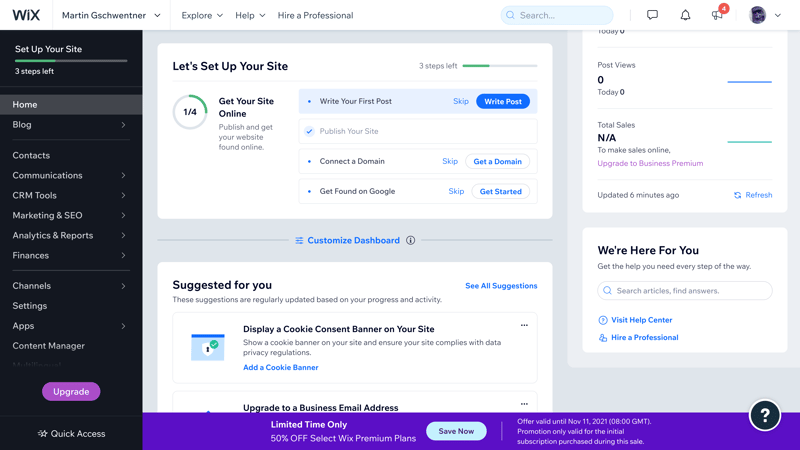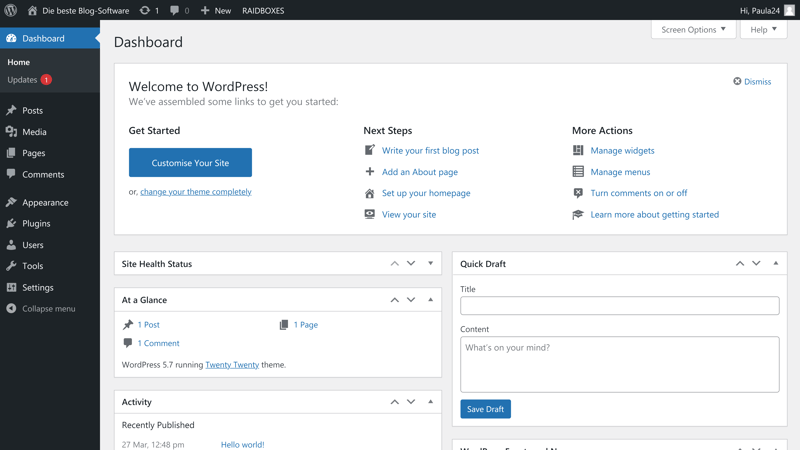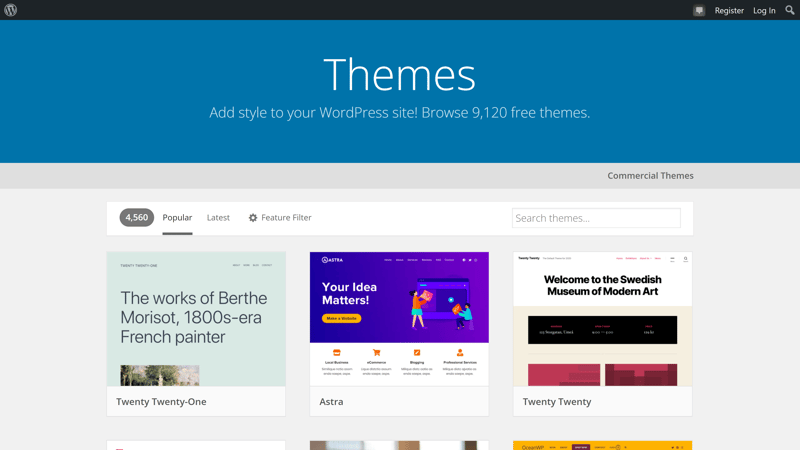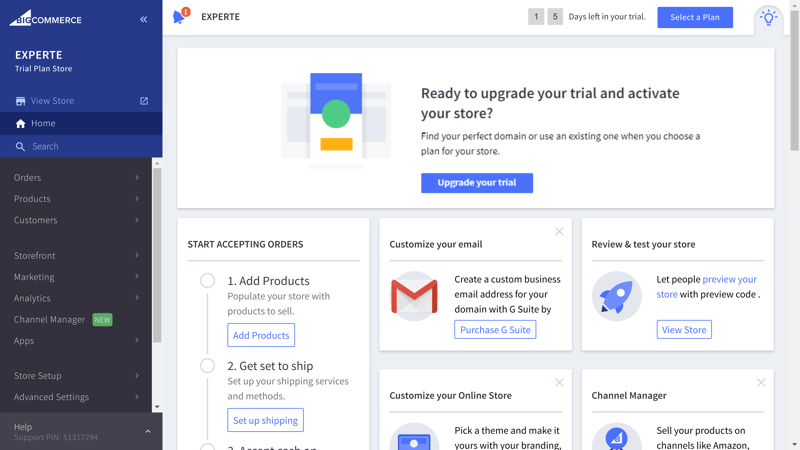Wix vs. WordPress – Which Platform is Better for Building a Website?
Want to create a website but don't know how? If you're not familiar with coding and don't want to hire expensive web designers or agencies, you can choose between a website builder and a content management system. Two of the most popular options are Wix and WordPress.
Let's look at how Wix and WordPress differ and which platform might work better for your needs.
Website Builder vs. CMS
The main difference between Wix and WordPress is simple: Wix is a website builder, while WordPress is a content management system (CMS). People sometimes use these terms interchangeably, but they're actually two different types of platforms.
Website builders like Wix make creating websites as simple as possible. They offer ready-made templates, user-friendly design tools, and simple drag-and-drop editors. Everything you need to run your website, including hosting and domain, comes included in the website builder package.
With a CMS like WordPress, you'll need to handle technical aspects more often yourself, but you get much more flexibility in your choices and design. You can manage all your website content and customize every detail - more than you can with website builders.
CMS platforms also have builder solutions like Elementor that you can use to design your website. This means a CMS can do everything a website builder can do, and much more. However, setting up, managing, and adding new features takes more work and requires more technical knowledge.
There are several differences between various website builders and CMS platforms on the market. Let's take a closer look at both programs:
Wix: Great All-Round Website Builder for Beginners

Wix combines easy-to-use features for beginners with powerful tools and design options, which helped it secure the top spot in our website builder comparison.
The user-friendly, AI-powered Wix editor offers many content blocks and pre-made elements that you can easily drag and drop anywhere on your page. If you can't find a feature you need in the basic tools, you can check out their well-stocked app marketplace.
Hosting and domain are included in the monthly subscription price - and Wix also offers a free version to try it out. In our opinion, Wix offers the best overall package in the website builder market, striking a great balance between ease of use and features.
WordPress: A CMS for All Your Needs
WordPress started as a blogging platform, but now you can create almost any type of website with this open-source platform - from blogs to online stores and business websites. WordPress offers more flexibility than Wix because you have much more control over your website's design and features.
While WordPress itself is free, you'll need to pay for things like hosting, domains, and many widgets and plugins. For example, if you want to use a website builder to create your site, you'll need to install it on WordPress first.
Wix vs. WordPress: Which Is Better?
Choosing between Wix and WordPress depends on your needs, skills, and budget.
Here's the deal: If you want a simple blog or basic website and don't want to deal with technical details, a website builder like Wix might be your best choice. But for more complex projects or websites that might grow significantly in the future, a CMS like WordPress is definitely the better option.
Let's look at both options step by step and break down their pros and cons.
Ease of Use
Ease of use is THE selling point of website builders. These platforms are designed for beginners with little to no coding experience. They're all-in-one systems that offer all important features under one roof.
This is exactly what Wix offers: The Wix editor makes building a website easy with user-friendly design tools, attractive templates, and simple drag-and-drop controls. While you'll need some time to learn all the settings, you can grasp the basics quickly.
Since Wix handles hosting and security, you can focus on designing your pages right from the start. If you get stuck, you can contact support through live chat, email, or phone (via callback service).

Wix puts ease of use first.
While WordPress is generally user-friendly and suitable for beginners, it doesn't guide you as much as Wix does. For any feature you want to add to your website, you need to find and install it yourself. Even the initial setup takes more work since you need to manually install WordPress on your web hosting.
You can use a website builder plugin with WordPress to create your site, but you'll still need to set this up manually. Also, WordPress doesn't offer direct customer support.
"Ease of use" depends on your experience level - advanced users will find WordPress very user-friendly too. But when it comes to beginners, Wix clearly takes the lead.
Features
Wix offers many features for a website builder: You get a huge selection of content elements, access to Wix's media tools including stock photo integration, extensive marketing tools, and extras like a logo maker or a mobile app for building on the go.
You can easily create multilingual websites with built-in features. And if Wix doesn't offer something you need, you can often find it in their well-stocked app market.
But no matter how many features Wix offers, it can't match WordPress's flexibility - like all other website builders. With WordPress, there are almost no limits - if you can't find a plugin or app for what you need, you can code it yourself.

However, you need to find and install these features, extensions, and plugins yourself - they're not served up on a silver platter like they are with Wix.
Wix can't compete with WordPress's flexibility and versatility: The almost unlimited customization options and huge selection of plugins and themes make WordPress the perfect choice for complex and custom website projects.
Design and Customization
When it comes to design, WordPress focuses on variety while Wix prioritizes convenience. With the website builder, you can simply pick from over 800 templates and customize them with relative freedom for a website builder: you can adjust colors, backgrounds, fonts, and effects in the design settings.
However, you're still somewhat limited by each theme's guidelines. Plus, you can't easily switch from one template to another.

WordPress offers a huge selection of themes that you can customize freely.
WordPress offers an even bigger selection of design templates: you'll find thousands of free and paid themes with various features. If you know how to code or hire help, you can even create a completely custom template for your WordPress project.
You can also switch your template anytime, so your website can grow along with your needs and business progress. You have more flexibility in customizing your templates too, though you'll need coding skills for custom designs.
While Wix lets you create a visually appealing website quickly and easily, WordPress opens up almost unlimited possibilities for custom designs through its huge variety of themes and customization options.
Ecommerce
Wix has built-in ecommerce features: You can add an online store with just a click and manage your products in a dedicated dashboard.
The website builder supports common payment methods and includes some marketing features like email newsletters, discounts, and a video maker. You can find some apps on the Wix marketplace to expand your online store's features, but as always, you're limited to what the feature package allows.

You can install ecommerce platforms like BigCommerce on WordPress to run your online store.
With WordPress, you can set up an online store using various plugins. The most popular ones include WooCommerce and BigCommerce, which offer many more ecommerce features than Wix and come with their own plugins and add-ons.
WordPress gives you much more flexibility, though you'll need to handle setting up your features yourself.
With WordPress, you can add powerful ecommerce plugins and combine their features with the CMS capabilities. This gives you complete control over your online store's design, features, and scalability.
SEO
Wix offers basic SEO settings that are important for websites: You can manually edit SEO content like meta descriptions, and Wix also helps you with an SEO plan to improve your website for search engines.
WordPress gives you many more options: You can use popular SEO plugins like Yoast or All in One SEO for WordPress (AIOSEO) to optimize every part of your website for Google and other search engines.
WordPress is better for SEO because it gives you more control over SEO settings and lets you use powerful plugins like Yoast and All in One SEO.
Costs
It's hard to compare costs directly because Wix and WordPress have different pricing models. Let's look at both briefly:
Wix Pricing
Wix offers a free plan, but it comes with a Wix subdomain and doesn't include many premium features.
Paid Wix plans cost between $12 and $50 per month. They differ in storage space, bandwidth, and features. Domain names and hosting, along with SSL certificates, come included in the packages (domains are free for the first year only).
You can pay for your Wix subscription monthly or yearly. The cheapest ad-free plan with a custom domain costs about $12 per month with annual billing. Read more about Wix pricing here:
WordPress Pricing
WordPress is free since it's open-source software. However, you need to get your own domain name and hosting, and set them up yourself.
Web hosting costs vary a lot depending on factors like the type of hosting (such as shared, VPS), bandwidth, and storage space. The most basic plans start at just a few dollars per month.
For a bit more money, you can choose a dedicated WordPress host who will handle the WordPress setup and configuration for you. While starter plans cost just a few dollars, prices can go up to $20-50 or even hundreds of dollars per month, depending on the number of WordPress installations and storage space you need.
Read more about WordPress pricing here:
Overall Results
As an all-in-one website builder, Wix is super user-friendly: You don't need any coding or web design skills to create your online project. With Wix's easy-to-use editor, you can put together a website, blog, or online store using different building blocks and pre-made sections.
Even though Wix offers many features for a website builder, you're always limited by what the platform can do.
WordPress needs more time to learn and hands-on effort since you have to handle your own hosting, domain, and project setup. But WordPress gives you way more options and flexibility in pretty much everything - features, ecommerce, blogs, and SEO - compared to Wix.
To make the most of what WordPress can do, beginners will likely need professional help.
Wix works best for simple websites like blogs or portfolios and for users who don't want to spend time learning a complex system like WordPress.
If you're willing to put in the time to learn, have some experience, or can get help with setup, WordPress will take you further - especially for big and complex projects.
Pros and Cons of Wix
All-in-one package including setup, hosting, and domain
Beginner-friendly editor with simple drag-and-drop controls
Over 800 design templates to choose from
Large app marketplace
Can't easily switch templates
Less flexibility than WordPress in every way (features, customization, ecommerce, SEO...)
Fewer third-party add-ons than WordPress
WordPress Pros and Cons
thousands of design templates
complete flexibility
countless plugins and add-ons
you need to manage hosting and domains yourself
setup is more complex than Wix
coding or outside help needed for full flexibility
Alternatives to Wix
In our website builder comparison, we took a close look at 17 programs and compared them across different review categories. Wix ranks first, followed closely by Squarespace and IONOS.
While we think Wix offers the best overall package, it's not better than its competitors in every way. For example, Squarespace has slightly more beautiful templates than Wix, and Shopify works even better for online stores.
To see how the other programs compare to Wix, check out our roundup of the best Wix alternatives:
Alternatives to WordPress
WordPress is the undisputed leader among content management systems, but it's worth looking at its competitors too. Open-source CMS like Drupal or Joomla offer similar features and flexibility as WordPress.
For multimedia projects, you might want to check out Headless CMS, which makes it super easy to display content on different devices through an API.
We've also put together the best WordPress alternatives for you:
Bottom Line
Both Wix and WordPress can help you create a professional website. As a website builder, Wix focuses mainly on making it easy to design your site. It gives you a good set of tools and features to manage your website - though these are somewhat limited.
WordPress, being a content management system, offers many more features and plugins. It can help you manage pretty much any type of website. Compared to Wix, WordPress is much more flexible and works better for growing and complex websites. However, it needs more hands-on work and is harder to use.
If you don't want to learn a CMS or hire outside help, and don't need anything too fancy, Wix makes it pretty easy to build your own website. But for bigger website projects, you'll benefit from the flexibility of a CMS like WordPress, which has fewer limitations in the long run.
FAQs
Wix is better for complete beginners who want to build a website quickly and affordably, and don't mind the limitations of a website builder. It's great for simple projects like blogs, portfolios, or basic business websites. WordPress offers much more flexibility and works better for complex projects and websites that might grow bigger. However, it's harder to set up and manage.
In EXPERTE.com's website builder review, Wix ranked #1, followed closely by Squarespace at #2 and IONOS at #3. Squarespace offers better-looking templates, while IONOS has a versatile editor similar to Wix. For more complex website projects, a content management system like WordPress usually works better than a website builder.
WordPress leads the pack among content management systems, but platforms like Drupal or Joomla offer similar features. For multimedia projects, a headless CMS like Contentful or Storyblok might work better, as they can display content on different devices through an API. For beginners who just want to create simple websites, website builders like Wix are worth checking out - you can build and publish websites without any coding or web design skills.



















